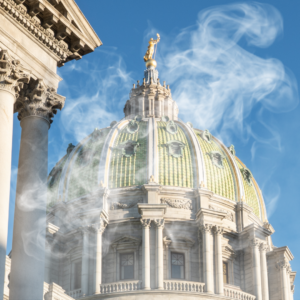By: Dan Bartkowiak
Today, the Pennsylvania Cable Network hosted a debate on marijuana legalization for their Capitol Preview program, and I was one of their guests.
You can watch the full PCN program tonight @ 7pm or online using PCN Select.
Several claims by the pro-retail marijuana side stood out to me that I would like to highlight in more detail:
False Claim #1: There has not been a significant rise in marijuana potency.
There are chemists and extractor technicians hired by today’s marijuana industry tasked with extracting the highest amount of THC (the potency strength) from marijuana. The potency levels and variety of extracts and products commercialized by the industry are like nothing we’ve ever seen. There are strains of the marijuana plant that are now in the 30% THC range (ex. one strain, Girl Scout Cookies, is around 30% THC), and extracts can be upwards of 90%+ THC.
“Highly potent manufactured cannabis products are available in retail stores, with THC content varying from 60-90%…They don’t resemble the plant – they are as close to the cannabis plant as strawberries are to frosted pop tarts.” – Dr. Beatrice Carlini, University of Washington
“Twenty years ago, prescription opioids were seen as a breakthrough in pain relief. We understand now the human costs of addiction and dysfunction. [Washington State] should not make the same mistake with high-potency marijuana.” – Seattle Times Editorial Board
False Claim #2: The 2023 study by Temple University did not conclude a rise in youth use in states experimenting with retail marijuana for recreational use.
Read the Temple U study for yourself: “The evidence presented here indicates that recreational cannabis legalization is likely to increase the prevalence of cannabis use among adolescents and young adults…”
Increased access + Commercialization = Increased use. Pennsylvania has seen this play out in other industries. As we have legalized nearly every form of gambling, calls to the state’s gambling addiction helpline reportedly tripled in the last four years. In response, the PA Gaming Control Board told ABC27, “There’s no doubt that access to gambling venues in Pennsylvania has significantly grown in the past several years due to the legalization of sports wagering and online gambling.”
Why would marijuana use (its increase and targeted use by teens and young adults) be any different with the increased access and commercialization should Pennsylvania officials choose to go the route of retail marijuana?
As said by Dr. Sheryl Ryan with the PA Chapter of the American Academy of Pediatrics: “We can reasonably expect that, with its legalization, the prevalence of marijuana use among both adults and adolescents will increase in our state.”
False Claim #3: Legalization for recreational use made marijuana boring.
The marijuana industry profits off of the habitual and harmful use of marijuana, and, just like the tobacco industry, targets young users to turn them into customers for life. Their commercialization efforts, including the variety of colorful high-potency extracts, make marijuana anything but boring.
This Big Tobacco 2.0 marijuana industry (which is heavily invested in retail marijuana), brings an “in-your-face” marijuana culture to states experimenting with retail marijuana, the result of which turns into more pot shops than McDonalds and Starbucks combined.

Additionally, if your line of thinking is that legalization makes marijuana boring, does that mean youth are looking to use more alternative drugs? The state of Oregon attempted the route of legalizing all drugs, which has proven to be disastrous.
###
Where do we draw the line in PA with drug use? The reality of today’s “super potent pot” and the many social costs that come with commercialization should cause Pennsylvania state lawmakers to oppose any effort to legalize retail marijuana for recreational use.
Dan Bartkowiak serves as Director of Communications for Pennsylvania Family Institute.





